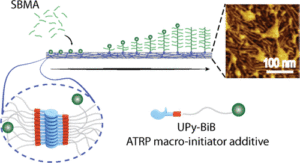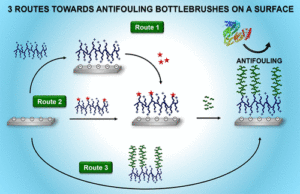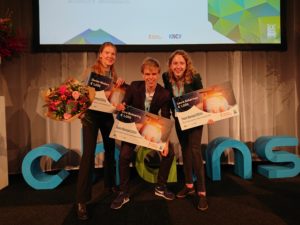The group welcomes the thesis students that have joined the lab for their thesis project. Good luck to Daphne, Eline, Luuk, Martijn and Thomas!
News
Collaborative paper with Dankers lab out in Macromolecules
The results of a collaborative project with the group of Patricia Dankers has been published in Macromolecules. In the project the functionalization of a supramolecular biomaterial with zwitterionic poly(sulfobetaine methacrylate) via atom transfer radical polymerization from a macroinitiator additive was achieved. In addition, the polymerization from the macroinitiator additive was successfully translated to functional electrospun scaffolds, showing the potential for this functionalization strategy in supramolecular material systems. The full paper can be read here.

Paper Esther and Andriy out in Langmuir
Esther and Andriy’s joint paper on the design, synthesis and characterisation of so-called bottlebrush coatings, based on a powerful combination of poly(N-(2-hydroxypropyl)methacrylamide) [poly(HPMA)] – known for its antifouling properties – and poly(L-lysine) (PLL) – selected for its ability to strongly adhere to surfaces – has been accepted for publication in Langmuir. Three routes to prepare antifouling coatings were developed by Esther and Andriy, and evaluated in terms of ease of synthesis, scalability, ease of characterization, and a preliminary investigation of their antifouling performance. The full paper can be read here.

Team NanopLESStic wins Holland Chemistry Student Competition
During the annual Dutch Chemistry Conference, Chains, students from our lab (and the BCT lab) at WUR were announced winner of the 2019 Holland Chemistry Student competition, for their work on a nanoplastics filter. On the NWO website you can read more about the project, and you can watch a video from the team.
Congrats to Team NanopLESStic: Dorien, Laura and Ezra. (And thanks to KWR, Royal HaskoningDHV, and Wetsus for their support).

Postdoc vacancy
Our group is looking for a postdoc to work on a 1-year project aimed at the development of sound-adsorbing polymer foam-based metamaterials. This project, which was started in 2018 as part of the Top Sector Chemistry Student Competition and which was ultimately the winning project, is now aiming at a more systematic study how foam-like polymer materials containing beads can be prepared, characterised and applied as sound-adsorbing materials. Based on the principle of local resonances and viscous dampening, such ‘metafoams’ are capable of dampening both high and low frequency sound. As a result, metafoams can help to tackle the issue of noise pollution, which has increased in severity over the years as a result of population growth, advances in technology and urbanisation.
More details on the vacancy and on how to apply can be found on our university’s website.
Welcome to Simon
Last month Simon van Hurne started as a PhD student in our lab. He will work together with fellow PhD student Sybren and Maarten on the Vidi project, entitled 4D Control over Smart Dynamic Polymers. In his PhD project Simon will develop new molecules and corresponding materials that will create smart, responsive polymers.
Paper in Advanced Science online
The results of our collaboration with Artur Stefankiewicz (Adam Mickiewicz University, Poznań) have been published online in Advanced Science.
In this work, we looked at the self-assembly of a naphthalene diimide monomer, designed to be soluble in a range of solvents. Depending on solvent and temperature, one of three different assembly states could be accessed.
More details can be read on the website of Advanced Science.
NanopLESStic Team in Holland Chemistry Student Competition 2019 final
A team of three honour students Molecular Life Sciences at Wageningen University made it to the final of the sixth edition of the Holland Chemistry Student Competition, which is organized by NWO together with Holland Chemistry. Ezra Bekkering, Dorien Westert and Laura Akkerman obtained a grant for their idea to prepare a filter that adsorbs nanoplastic from aqueous streams. The internship work will be performed in the labs of Biobased Chemistry & Technology (Dr Elinor Scott) and Organic Chemistry (Dr Smulders and Dr de Smet). KWR, Royal HaskoningDHV and Wetsus have indicated to support this project and are interested in the results. ORC wishes the NanopLESStic team a lot of success with their project and looks forward to the presentation of the results at CHAINS 2019.
More info can be found on the website of NWO (Dutch / English).
PhD vacancy
Our lab has a vacancy for a PhD position in the area Dynamic Polymer Materials. The position is part of a NWO-funded Vidi project, entitled “4D control over smart dynamic polymers” that was recently awarded to Maarten Smulders.
For more details on the vacancy and to apply, please go to our university’s website.
Maarten promoted to associate professor
Five and half years after starting as an assistant professor in October 2013, as of March 2019 Maarten was promoted to (tenured) associate professor. He will continue to work on the development of smart, dynamic polymer materials with molecularly controlled properties and functions.